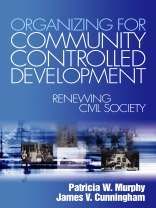‘It is a worthy book, with probably the best collection of resources anywhere for those trying to combine organizing and development.’
–SHELTERFORCE MAGAZINE
Organizing for Community Controlled Development is about renewing and revitalizing local living places through shared grassroots work focused on stimulating racial unity, civic vigor, and economic fairness. It proposes a detailed model for understanding the communities we call home and for guiding residents and their allies to strengthen local assets, reduce distress, and make and control needed social, political, and economic plans for change. This book′s coast-to-coast and beyond set of down-to-earth case studies aims at helping readers understand what are effective and what are ineffective methods for tackling renewal.
Key Features
- Cases and their assessments: These offer ways that small communities across the globe today can honor diversity and civic responsibility and build programs that promote and facilitate year-around participation, while maintaining fruitful links to the governments, businesses, foundations and other institutions that can provide essential resources for change
- ‘How to’ chapters: These chapters contain detailed, tested techniques for recruiting, planning, fundraising, communicating, leadership growth, and other skills and processes that are part of the book′s model which combines community organizing and community economic development.
- Suggestions on how and why authentic renewal groups can lay claim to resources adequate to carry out quality programs and projects with lasting impact: Throughout, the authors propose how organizing, planning, and implementation activities can be carried out with widespread inclusion of residents and other parties of interest, thereby insuring authenticity, ownership and support.
- Technical chapters on making a long-range plan for a renewal organization: Making a plan for a small community and all its interests is covered from building social strength, securing adequate resources, building a community′s financial assets, and creating affordable housing, to transforming a local shopping area, and boosting workforce development.
Intended Audience: The book was written for students who aspire to work as community organizers, and all those who practice organizing and community development whether as volunteers or professionals.
قائمة المحتويات
A Personal Preface
Acknowledgments
Chapter 1 Introduction
Chapter 2 The Potency of Community Power
Chapter 3 Community Development Corporations and the Resurgence of Organizing
Chapter 4 The Small Community
Chapter 5 Community Organizing: Principal Tool for Change and Reform
Chapter 6 Participation: Lifeblood of Renewal
Chapter 7 Aliquippa: A Small Community on the Front Line
Chapter 8 Forging an Organizational Plan
Chapter 9 Unity in Creating a Comprehensive Community Plan
Chapter 10 Maximizing Social Strength
Chapter 11 Tapping Essential Resources
Chapter 12 Capital Formation: Building Community Financial Assets
Chapter 13 Neighborhood Preservation Through Affordable Housing
Chapter 14 Business District Renewal: Transforming Your Shopping Area
Chapter 15 Workforce Development: Strengthening the Economic Base of the Small Community
Chapter 16 Organizing for Community Controlled Development and the Promise of Coalition Politics
Index
About the Authors
عن المؤلف
Jim Cunningham was born in Chicago where he did political and neighborhood development organizing in the 1950s, before moving to Pittsburgh whose neighborhood people were in 1959 beginning to participate in the city′s renewal effort. As an organizer for ACTION-Housing he assisted neighborhood people to build organizations that gave them a voice in decisions which affected their lives. Pittsburgh issues then as now were race, jobs and who makes the public decisions that impact on families and small communities. After working for seven years with residents and their allies he began to teach community organizing at the School of Social Work of the University of Pittsburgh.
He helped to create a masters program built on 50% time in field experience and 50% in academic studies, which drew a steady stream of students from the U.S. and abroad. Along the route he published four books including The Resurgent Neighborhood (Fides, 1965), Urban Leadership During the Sixties (Brandeis, 1970), A New Public Policy for Neighborhood Preservation (Praeger, 1979, co-authored with Roger Ahlbrandt), and Building Neighborhood Organizations (Notre Dame, 1983, co-authored with Milton Kotler).
Jim retired from full-time teaching in 1997 and continues to teach part-time, and to write, while serving as a volunteer with the Race and Reconciliation Dialogue Group of St.Paul Cathedral Parish, and with the Living Wage Campaign for the Pittsburgh region.
Jim Cunningham was born in Chicago where he did political and neighborhood development organizing in the 1950s, before moving to Pittsburgh whose neighborhood people were in 1959 beginning to participate in the city′s renewal effort. As an organizer for ACTION-Housing he assisted neighborhood people to build organizations that gave them a voice in decisions which affected their lives. Pittsburgh issues then as now were race, jobs and who makes the public decisions that impact on families and small communities. After working for seven years with residents and their allies he began to teach community organizing at the School of Social Work of the University of Pittsburgh.
He helped to create a masters program built on 50% time in field experience and 50% in academic studies, which drew a steady stream of students from the U.S. and abroad. Along the route he published four books including The Resurgent Neighborhood (Fides, 1965), Urban Leadership During the Sixties (Brandeis, 1970), A New Public Policy for Neighborhood Preservation (Praeger, 1979, co-authored with Roger Ahlbrandt), and Building Neighborhood Organizations (Notre Dame, 1983, co-authored with Milton Kotler).
Jim retired from full-time teaching in 1997 and continues to teach part-time, and to write, while serving as a volunteer with the Race and Reconciliation Dialogue Group of St.Paul Cathedral Parish, and with the Living Wage Campaign for the Pittsburgh region.












